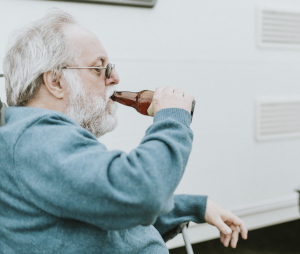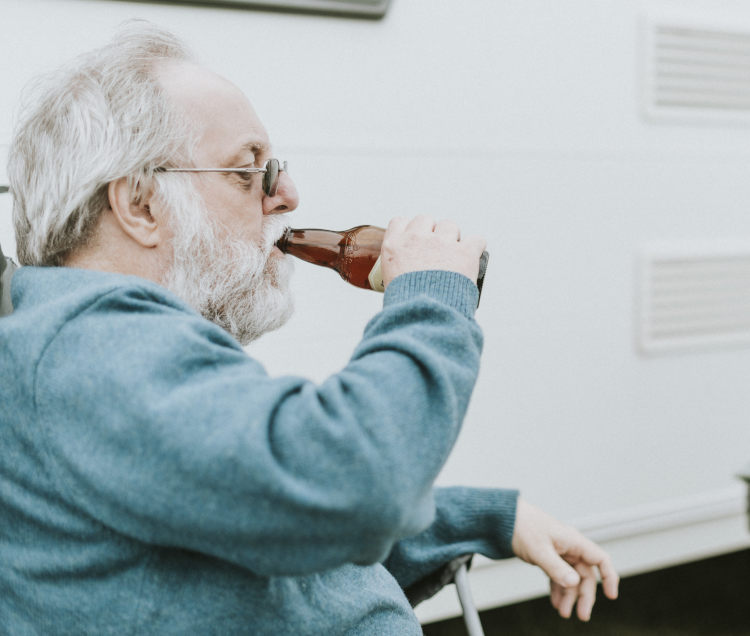 Most people associate binge drinking with rebellious teens and party-loving college students, but this dangerous form of alcohol consumption occurs among people of all ages. In fact, a study published by the Journal of the American Geriatrics Society found that 10% of all adults over 65 regularly engage in binge drinking.
Most people associate binge drinking with rebellious teens and party-loving college students, but this dangerous form of alcohol consumption occurs among people of all ages. In fact, a study published by the Journal of the American Geriatrics Society found that 10% of all adults over 65 regularly engage in binge drinking.
What Qualifies as Binge Drinking?
Binge drinking is loosely defined as an excessive consumption of alcohol in a short period of time. There is some debate as to how many drinks this involves, but most exports have settled on defining binge drinking as five or more drinks at one time for men or four or more drinks at one time for women.
Unfortunately, as a person ages, it becomes harder for their body to process alcohol. Because of this, the National Institute on Alcohol Abuse and Alcoholism suggests that healthy people over age 65 with no chronic diseases have no more than three drinks per day. Considering that 80% of adults in this age group have at least one chronic health condition—including heart disease, diabetes, and cancer—this means that a sizable number of seniors are putting their health at risk due to excess alcohol consumption.
Why Are Seniors Vulnerable?
It is common for people of all ages to self-medicate with alcohol when they are struggling to manage their mental health. Seniors may turn to alcohol to cope with age-related challenges such as:
- Death of a spouse or close friend
- Empty nest syndrome when adult children and grandchildren live far away
- Trouble adjusting to retirement
- Stress and anxiety from financial difficulties or forced downsizing
- Problems with chronic pain
- Depression due to declining health
Although seniors who struggled with addiction in their younger years are the most vulnerable, it’s important to remember that a substance use disorder can develop at any time. Many seniors seeking treatment for substance use disorders were only social drinkers in their youth.
Older men are more likely to binge drink than older women. However, rates of binge drinking among women have been steadily increasing over the last decade.
What Are the Specific Risks Associated With Binge Drinking?
The CDC has found that binge drinking and heavy alcohol consumption lead to nearly 21,000 deaths each year among those ages 65 and older. Additionally, 6 to 11% of hospital admissions among seniors are thought to be related to alcohol or substance misuse.
Some of the specific risks associated with binge drinking as a senior include:
- Worsening of chronic illness. The types of chronic diseases that are common in the elderly are all negatively affected by alcohol consumption. For example, drinking can make a person’s blood sugars go up, and drinking while taking blood thinners after a heart attack can lead to dangerous internal bleeding in the stomach.
- Worsening of mental health. Seniors who are struggling with depression and anxiety may try to self-medicate with alcohol, but binge drinking’s effects are only temporary. Alcohol is a depressant that will only serve to worsen pre-existing conditions.
- Issues with medication management. Binge drinking can increase the chances that a person will forget to take their medications as scheduled. Drinking can also cause potentially dangerous drug interactions with prescription drugs as well as over-the-counter medications or dietary supplements.
- Increased injuries. Binge drinking increases the risk of accidental injury. Broken hips can be particularly dangerous, as this type of injury often results in an older adult no longer being able to live independently. Accidents related to drunk driving can also have severe consequences.
- Cognitive impairment. Excessive alcohol consumption can cause issues with memory, concentration, judgment, and problem-solving. This can worsen the effects of age-related cognitive impairment and potentially lead to alcohol-related dementia.
What Treatment Options Are Available?
While binge drinking does not automatically mean a person is suffering from a substance use disorder, continuing to drink to excess despite difficulties with overall health, personal finances, and relationships with loved ones suggests that a substance abuse evaluation is in order.
Substance use disorders in seniors often go undetected because of a general lack of public awareness about the relationship between age and addiction. However, it’s important to remember that treatment is effective at any age.
We Are Here To Help
At St. Joseph Institute for Addiction, we provide personalized treatment based on Christian, non-denominational principles. Our Pennsylvania residential addiction treatment center features elegant log and stone lodges, miles of walking trails, wellness center, gym, library, and chapel. Through intensive counseling, medication-assisted treatment, and holistic support services, we help clients develop the skills they need to live a wellness-focused lifestyle free from the burden of substance abuse. We also provide access to a range of continuing care resources designed to ease the transition back to independent living.
To learn more about SJI Pennsylvania alcoholism treatment, and our programs, please contact us at (814) 228-8881.


